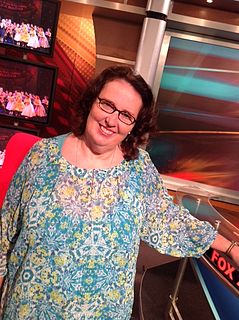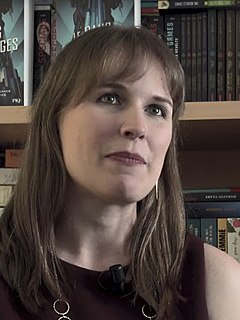A Quote by Cassandra Clare
You had every right to be. He raised his eyes to look at her and she was suddenly and strangely reminded of being four years old at the beach, crying when the wind came up and blew away the castle she had made. Her mother had told her she could make another one if she liked, but it hadn't stopped her crying because what she had thought was permanent was not permanent after all, but only made out of sand that vanished at the touch of wind and water.
Related Quotes
At that moment a very good thing was happening to her. Four good things had happened to her, in fact, since she came to Misselthwaite Manor. She had felt as if she had understood a robin and that he had understood her; she had run in the wind until her blood had grown warm; she had been healthily hungry for the first time in her life; and she had found out what it was to be sorry for someone.
Now very much against her will, she thought of the way Jace had looked at her then, the blaze of faith in his eyes, his belief in her. He had always thought she was strong. He had showed it in everything he did, in every look and every touch. Simon had faith in her too, yet when he'd held her, it had been as if she were something fragile, something made of delicate glass. But Jace had held her with all the strength he had, never wondering if she could take it--he'd known she was as strong has he was.
She liked being reminded of butterflies. She remembered being six or seven and crying over the fates of the butterflies in her yard after learning that they lived for only a few days. Her mother had comforted her and told her not to be sad for the butterflies, that just because their lives were short didn't mean they were tragic. Watching them flying in the warm sun among the daisies in their garden, her mother had said to her, see, they have a beautiful life. Alice liked remembering that.
I found her lying on her stomach, her hind legs stretched out straight, and her front feet folded back under her chest. She had laid her head on his grave. I saw the trail where she had dragged herself through the leaves. The way she lay there, I thought she was alive. I called her name. She made no movement. With the last ounce of strength in her body, she had dragged herself to the grave of Old Dan.
She suddenly understood why she had let him kiss her in the diner, why she had wanted him at all. She wanted to control him. He was every arrogant boyfriend that had treated her mother badly. He was every boy that told her she was too freaky, who had laughed at her, or just wanted her to shut up and make out. He was a thousand times less real than Roiben.
I was bullied by my siblings and cousins, so make-believe was a way in which I could be in charge. When I was like 10 and my sister was about five, I convinced her that she was going to jail because she used a bad word. The doorbell happened to ring, and I told her it was the police. I made her pack her bags. She was crying, and then I said to her, "I forgive you, and I'm gonna tell the cop to go away." Then, of course, she loved me. It was terrible - she still remembers it. I had a sordid sense of humor.
She had witnessed the world's most beautiful things, and allowed herself to grow old and unlovely. She had felt the heat of a leviathan's roar, and the warmth within a cat's paw. She had conversed with the wind and had wiped soldier's tears. She had made people see, she'd seen herself in the sea. Butterflies had landed on her wrists, she had planted trees. She had loved, and let love go. So she smiled.
She expected the pain, when it came. But she gasped at its sharpness; it was not like any pain she had felt before. He kissed her and slowed and would have stopped. But she laughed, and said that this one time she would consent to hurt, and bleed, at his touch. He smiled into her neck and kissed her again and she moved with him through the pain. The pain became a warmth that grew. Grew, and stopped her breath. And took her breath and her pain and her mind away from her body, so that there was nothing but her body and his body and the light and fire they made together.
She didn’t understand why it was happening,” he said. “I had to tell her she would die. Her social worker said I had to tell her. I had to tell her she would die, so I told her she was going to heaven. She asked if I would be there, and I said that I would not, not yet. But eventually, she said, and I promised that yes, of course, very soon. And I told her that in the meantime we had great family up there that would take care of her. And she asked me when I would be there, and I told her soon. Twenty-two years ago.
She had been sharing a house with him for a week, and he had not once flirted with her. He had worked with her, asked her opinion, slapped her on the knuckles figuratively speaking when she was on the wrong track, and acknowledged that she was right when she corrected him. Dammit, he had treated her like a human being.
In this moment she felt that she had been robbed of an enormous number of valuable things, whether material or intangible: things lost or broken by her own fault, things she had forgotten and left in houses when she moved: books borrowed from her and not returned, journeys she had planned and had not made, words she had waited to hear spoken to her and had not heard, and the words she meant to answer with. . . .

































